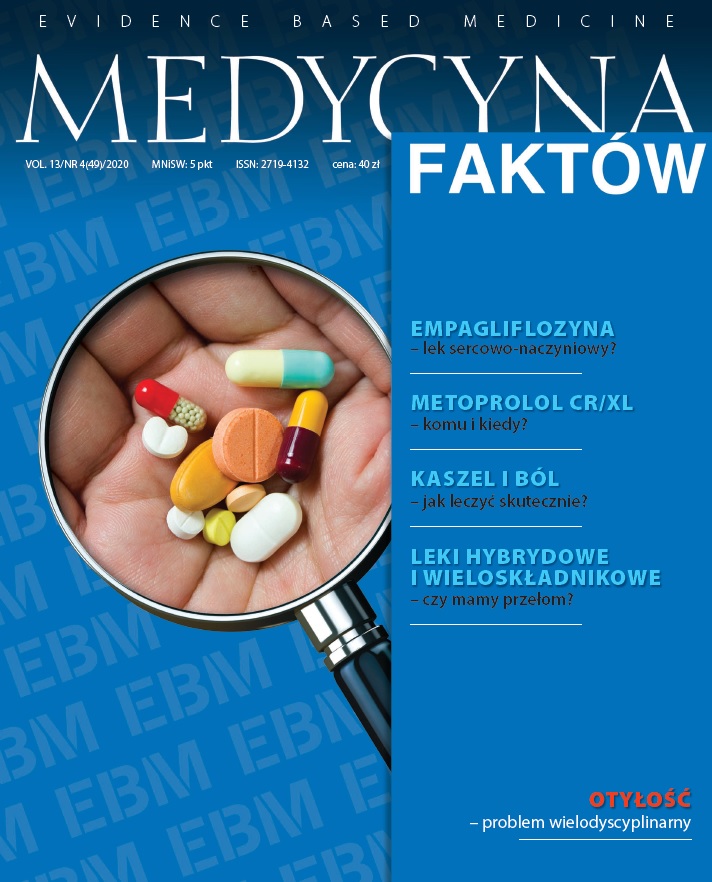What does the EMPA-REG Outcome study mean for a cardiologist? Review article
Main Article Content
Abstract
Most of the currently used drugs in diabetes reduce only the risk of macrovascular complications. This effects in only a small reduction of total mortality. The article describes empagliflozin – the first drug that reduces total mortality in diabetic patients with high cardiovascular risk.
Article Details
How to Cite
Gaciong , Z., & Dzida , G. (2020). What does the EMPA-REG Outcome study mean for a cardiologist?. Medycyna Faktow (J EBM), 13(4(49), 399-402. https://doi.org/10.24292/01.MF.0420.3
Issue
Section
Articles
Copyright © by Medical Education. All rights reserved.
References
1. Gæde P, Oellgaard J, Carstensen B et al. Years of life gained by multifactorial intervention in patients with type 2 diabetes mellitus and microalbuminuria: 21 years follow-up on the Steno-2 randomised trial. Diabetologia. 2016; 59: 2298-307.
2. Zinman B, Wanner C, Lachin JM et al. EMPA-REG OUTCOME Investigators: Empagliflozin, Cardiovascular Outcomes, and Mortality in Type 2 Diabetes N Engl J Med. 2015; 373: 2117-28.
3. Wanner C, Inzucchi SE, Lachin JM et al. EMPA-REG OUTCOME Investigators: Empagliflozin and Progression of Kidney Disease in Type 2 Diabetes N Engl J Med. 2016; 375: 323-34.
4. Verma S, Mazer CD, Al-Omran M et al. Cardiovascular Outcomes and Safety of Empagliflozin in Patients With Type 2 Diabetes Mellitus and Peripheral Artery Disease: A Subanalysis of EMPA-REG OUTCOME. Circulation. 2018; 137: 405-7.
5. Wanner C, Lachin JM, Inzucchi SE et al. EMPA-REG OUTCOME Investigators: Empagliflozin and Clinical Outcomes in Patients With Type 2 Diabetes Mellitus, Established Cardiovascular Disease, and Chronic Kidney Disease. Circulation. 2018; 137: 119-29.
6. Verma S, Mazer CD, Fitchett D et al. Empagliflozin reduces cardiovascular events, mortality and renal events in participants with type 2 diabetes after coronary artery bypass graft surgery: subanalysis of the EMPA-REG OUTCOME® randomised trial. Diabetologia. 2018; 61: 1712-23.
7. Standards of Medical Care in Diabetes. Diabetes Care 2019; 42(suppl 1): S1-S2.
8. Zalecenia kliniczne dotyczące postępowania u chorych na cukrzycę 2019. Stanowisko Polskiego Towarzystwa Diabetologicznego.
9. Abdul-Ghani M, Del Prato S, Chilton R et al. SGLT2 inhibitors and cardiovascular risk: lessons learned from the EMPA-REG OUTCOME study. Diabetes Care. 2016; 39: 717-25.
10. Mora-Fernández C, Domínguez-Pimentel V, de Fuentes MM. Diabetic kidney disease: from physiology to therapeutics. J Physiol. 2014; 592: 3997-4012.
11. Toth-Manikowski S, Atta MG. Diabetic kidney disease: pathophysiology and therapeutic targets. J Diabetes Res. 2015; 2015: 697010.
12. Corriere M, Rooparinesingh N, Kalyani RR. Epidemiology of diabetes and diabetes complications in the elderly: an emerging public health burden. Curr Diab Rep. 2013; 13: 805-13.
13. Dieter BP, Alicic RZ, Meek RL. Novel therapies for diabetic kidney disease: storied past and forward paths. Diabetes Spectr. 2015; 28: 167-74.
14. Altemtam N, Russell J, El Nahas M. A study of the natural history of diabetic kidney disease (DKD). Nephrol Dial Transplant. 2012; 27: 1847-54.
2. Zinman B, Wanner C, Lachin JM et al. EMPA-REG OUTCOME Investigators: Empagliflozin, Cardiovascular Outcomes, and Mortality in Type 2 Diabetes N Engl J Med. 2015; 373: 2117-28.
3. Wanner C, Inzucchi SE, Lachin JM et al. EMPA-REG OUTCOME Investigators: Empagliflozin and Progression of Kidney Disease in Type 2 Diabetes N Engl J Med. 2016; 375: 323-34.
4. Verma S, Mazer CD, Al-Omran M et al. Cardiovascular Outcomes and Safety of Empagliflozin in Patients With Type 2 Diabetes Mellitus and Peripheral Artery Disease: A Subanalysis of EMPA-REG OUTCOME. Circulation. 2018; 137: 405-7.
5. Wanner C, Lachin JM, Inzucchi SE et al. EMPA-REG OUTCOME Investigators: Empagliflozin and Clinical Outcomes in Patients With Type 2 Diabetes Mellitus, Established Cardiovascular Disease, and Chronic Kidney Disease. Circulation. 2018; 137: 119-29.
6. Verma S, Mazer CD, Fitchett D et al. Empagliflozin reduces cardiovascular events, mortality and renal events in participants with type 2 diabetes after coronary artery bypass graft surgery: subanalysis of the EMPA-REG OUTCOME® randomised trial. Diabetologia. 2018; 61: 1712-23.
7. Standards of Medical Care in Diabetes. Diabetes Care 2019; 42(suppl 1): S1-S2.
8. Zalecenia kliniczne dotyczące postępowania u chorych na cukrzycę 2019. Stanowisko Polskiego Towarzystwa Diabetologicznego.
9. Abdul-Ghani M, Del Prato S, Chilton R et al. SGLT2 inhibitors and cardiovascular risk: lessons learned from the EMPA-REG OUTCOME study. Diabetes Care. 2016; 39: 717-25.
10. Mora-Fernández C, Domínguez-Pimentel V, de Fuentes MM. Diabetic kidney disease: from physiology to therapeutics. J Physiol. 2014; 592: 3997-4012.
11. Toth-Manikowski S, Atta MG. Diabetic kidney disease: pathophysiology and therapeutic targets. J Diabetes Res. 2015; 2015: 697010.
12. Corriere M, Rooparinesingh N, Kalyani RR. Epidemiology of diabetes and diabetes complications in the elderly: an emerging public health burden. Curr Diab Rep. 2013; 13: 805-13.
13. Dieter BP, Alicic RZ, Meek RL. Novel therapies for diabetic kidney disease: storied past and forward paths. Diabetes Spectr. 2015; 28: 167-74.
14. Altemtam N, Russell J, El Nahas M. A study of the natural history of diabetic kidney disease (DKD). Nephrol Dial Transplant. 2012; 27: 1847-54.

